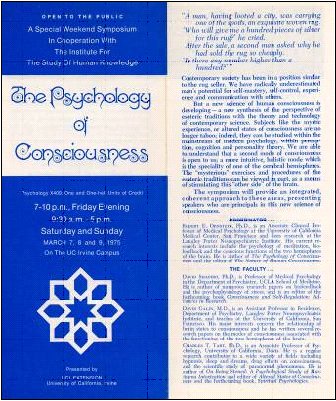Psychologies – East and West Seminar: March 1975
THE PSYCHOLOGY OF CONSCIOUSNESS
A Special Weekend Symposium
Friday, Saturday and Sunday
March 7, 8, and 9, 1975
Presented by
UCI Extension
University of California, Irvine
In Cooperation With
The Institute for the Study of Human Knowledge

“A man, having looted a city, was carrying one of the spoils, an exquisite woven rug. ‘Who will give me a hundred pieces of silver for this rug?’ he cried. After the sale, a second man asked why he had sold the rug so cheaply. ‘Is there any number higher than a hundred?'”
Contemporary society has been in a position similar to the rug seller. We have radically underestimated man’s potential for self-mastery, self-control, experience and communication with others.
But a new science of human consciousness is developing – a new synthesis of the perspective of esoteric traditions with the theory and technology of contemporary science. Subjects like the mystic experience, or altered states of consciousness are no longer taboo; indeed, they can be studied within the mainstream of modern psychology, within perception, cognition and personality theory. We are able to understand that a second mode of consciousness is open to us; a more intuitive, holistic mode which is the speciality of one of the cerebral hemispheres. The “mysterious” exercises and procedures of the esoteric traditions can be viewed in part, as a means of stimulating this “other side” of the brain.
The symposium will provide an integrated, coherent approach to these areas, presenting speakers who are principals in this new science of consciousness.
COORDINATOR
ROBERT E. ORNSTEIN, Ph.D., is an Associate Clinical Professor of Medical Psychology at the University of California Medical Center, San Francisco and does research at the Langley Porter Neuropsychiatric Institute. His current research interests include the psychology of meditation, biofeedback and the conscious functions of the two hemispheres of the brain. He is author of The Psychology of Consciousness and the editor ofThe Nature of Human Consciousness.
THE FACULTY
DAVID SHAPIRO, Ph.D., is Professor of Medical Psychology in the Department of Psychiatry, UCLA School of Medicine. He is author of numerous research papers on biofeedback and the psychophysiology of stress, and is an editor of the forthcoming book Consciousness and Self-Regulation: Advances in Research.
DAVID GALIN, M.D., is an Assistant Professor in Residence, Department of Psychiatry, Langley Porter Neuropsychiatric Institute, and teaches at the University of California, San Francisco. His major interests concern the relationship of brain states to consciousness and he has written several research papers on the modes of consciousness associated with the functioning of the two hemispheres of the brain.
CHARLES T. TART, Ph.D., is an Associate Professor of Psychology, University of California, Davis. He is a regular research contributor to a wide variety of fields including hypnosis, sleep and dreams, drug effects on consciousness, and the scientific study of paranormal phenomena. He is author of On Being Stoned: A Psychological Study of Marijuana Intoxication and editor of Altered States of Consciousness and the forthcoming book, Spiritual Psychologies.
THE PROGRAM
FRIDAY, MARCH 7th, 7:00-10:00 P.M.
The Psychology of Consciousness: An Introduction
Robert E. Ornstein, Ph.D.
Contemporary psychology is changing, and now includes many areas ignored or forgotten in the last half-century. Of central concern is the nature of human consciousness. How we perceive “reality” depends upon the nature of our sensory systems, past experiences, moods, and training. If our ordinary consciousness, therefore, is a personal construction and only one of many possible ways of organizing “reality,” then consciousness can be changed by changing the way we construct it.
SATURDAY, MARCH 8th, MORNING SESSION: 9:30-12:30
Biofeedback And The Voluntary Control Of Internal States
David Shapiro, Ph.D.
Western science has only recently begun to explore the possibilities for training the voluntary control of internal physiological and mental states. New areas for research in psychosomatic medicine and mind-body self-regulation are opening up as a result of the development of biofeedback devices which provide objective readings of bodily activities and the scientific study of yogis who can control various physiological processes. Slides and a film on biofeedback research will be shown.
AFTERNOON SESSION: 2:00-5:00
The Traditional Esoteric Psychologies
Robert E. Ornstein, Ph.D.
While Western culture has cultivated a rational, verbal analytic mode of consciousness, the Eastern traditions like Yoga, Zen, and Sufism have specialized in the education of intuition. As a result, many esoteric practices like meditation, body movement, story telling, and crafts can be understood as well-developed techniques for turning off the analytic mode of consciousness and shifting consciousness into a more intuitive mode.
SUNDAY, MARCH 9th, MORNING SESSION: 9:30-12:30
Two Modes Of Consciousness: The Left And Right Hemispheres
David Galin, M.D.
The cortex of the human brain is divided into two halves, each with its own specialty. The left hemisphere in most people underlies analytic, sequential, and rational thought – particularly language. The right half seems to work holistically; it handles complex patterns in which the various parts are taken as a whole – the kind of thought which characterizes the dreamer, the artist, the craftsman, or the mystic. Implications of this biological duality for education and psychiatry will be discussed.
AFTERNOON SESSION: 2:00-5:00
The Paranormal: A Scientific View
Charles T. Tart, Ph.D.
Do the age-old claims for mind-to-mind communication and other paranormal phenomena have any scientific validity? The principal findings of modern parapsychology, including such phenomena as telepathy, clairvoyance, precognition, and psychokinesis, will be outlined and their implications for a more expanded view of man and the universe will be discussed.
